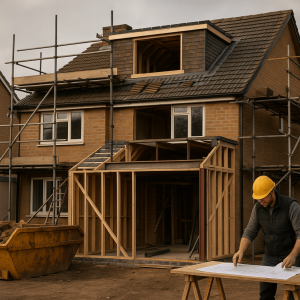Updated: January 2025
From April 2025, planning application fees across England will undergo major changes. These adjustments, derived from last year’s National Planning Policy Framework consultation, aim to better align fees with inflation and local authority costs.
In this guide, we break down these changes, what they mean for homeowners, developers, and businesses, and how to prepare for the upcoming transition.
Table of Contents
- Key Changes to Planning Fees (April 2025)
- Inflation-Linked Fee Increases
- New Fees for Householder Applications
- Higher Fees for Prior Approval Applications
- Fee Changes for Discharging & Varying Conditions
- Corrections to Previous Fee Amendments
- How to Prepare for the Fee Changes
- Frequently Asked Questions
🔍 Key Changes to Planning Fees (April 2025)
The new planning fee structure is part of a broader effort to help local planning authorities recover costs and ensure a more sustainable planning system. The most significant changes include:
- Annual fee increases linked to inflation (1.7% in 2025).
- Significant rises for householder and prior approval applications.
- Higher costs for discharging and varying planning conditions.
- Corrections to previous fee calculation errors.
📈 Inflation-Linked Fee Increases
From April 2025, planning fees will increase annually based on the Consumer Prices Index (CPI). For 2025, this means a 1.7% rise in most application fees. Expect similar yearly adjustments moving forward.
🏠 New Fees for Householder Applications
Householder planning applications, covering alterations or extensions, will see notable increases:
- Single dwellinghouse: £258 → £528 (104% increase).
- Two or more dwellinghouses: £509 → £1,043.
- Small-scale works: £258 → £262 (inflation-only rise).
🏗️ Higher Fees for Prior Approval Applications
Prior approval application fees will double in most cases:
- Standard prior approvals: £120 → £240.
- Building operations: £258 → £516.
- Change of use to residential: £125 per dwelling → £250 per dwelling.
📜 Fee Changes for Discharging & Varying Conditions
The cost of discharging or varying planning conditions is increasing:
- Discharge of conditions (householder): £43 → £86.
- Discharge of conditions (other developments): £145 → £298.
- Variation/removal of conditions:
- Householder: £86.
- Non-major development: £586.
- Major development: £2,000.
⚠️ Corrections to Previous Fee Amendments
Two notable corrections have been made:
- A typo in the base fee for large buildings has been corrected.
- The fee banding for agricultural buildings is now more consistent.
🛠️ How to Prepare for the Fee Changes
To avoid unexpected costs, consider these steps:
- Submit applications before April 2025 to benefit from current rates.
- Use Planning Portal’s fee calculator to estimate your costs.
- Stay updated on further adjustments by following official government updates.
❓ Frequently Asked Questions
1. How much are planning fees increasing?
Most planning application fees are increasing by 100%, meaning applicants will pay twice as much as before. However, some fees are only increasing in line with inflation at 1.7%, based on the Consumer Prices Index (CPI) from September 2024.
For example:
- The fee for householder applications (e.g., home extensions) will rise from £258 to £528.
- The cost of a prior approval application for certain developments will double from £120 to £240.
- Fees for discharging planning conditions will also double, with householder developments increasing from £43 to £86, and other developments rising from £145 to £298.
These increases are designed to help local planning authorities recover costs more effectively, ensuring they have the resources to process applications efficiently.
2. Will these fees increase every year?
Yes. Starting in April 2025, planning fees will automatically increase annually based on the previous September’s CPI rate. This means fees will adjust in response to inflation, preventing them from remaining static for years, as they have in the past.
For example, if inflation remains around 2% per year, a householder application that costs £528 in 2025 could increase to around £539 in 2026, and £550 in 2027, and so on.
3. Are there exemptions?
Yes, some planning applications are exempt from fees or subject to reduced costs. Exemptions include:
- Applications related to disabled access and adaptations – For example, if you’re applying for planning permission to install a wheelchair ramp or adapt a home for disabled use, the fee may be waived.
- Applications for listed buildings – Certain works involving listed buildings may not incur standard planning fees.
- Resubmitted applications – If a previous application was refused or withdrawn within a certain timeframe, resubmitting it may not require an additional fee.
It’s always best to check with your local authority or use the Planning Portal for specific exemption criteria.
4. What happens if I submit my application before April 2025?
If you submit your planning application before April 1, 2025, you will pay the current lower fees instead of the new higher rates.
For example:
- A householder application submitted in March 2025 will cost £258.
- The same application submitted in April 2025 will cost £528.
For developers and homeowners planning major works, it might be beneficial to submit applications sooner rather than later to avoid the fee increase.
5. Where can I check the full fee schedule?
The full list of updated planning fees will be published on the Planning Portal. This will include a breakdown of:
- Standard planning application fees.
- Additional fees for prior approvals and discharging conditions.
- Exceptions and exemptions.
Local planning authorities may also publish their own guidance on specific costs for their area.
6. Will local authorities set their own fees in the future?
Possibly. The government has suggested that local planning authorities (LPAs) may eventually be given the power to set their own planning fees based on local needs.
This would allow councils to adjust fees based on regional factors, such as:
- High-demand areas (e.g., London) potentially setting higher fees.
- Lower-demand regions keeping fees more affordable.
- Allowing LPAs to allocate resources where needed to improve planning services.
However, this change has not yet been implemented, and the government has stated that a “comprehensive review of national fees” will take place before any decisions are made.
7. Do these fees include Planning Portal’s admin charges?
No. The Planning Portal charges an additional £70 per application as an administrative fee.
This means that if you submit a householder application in April 2025, your total cost would be:
- £528 (application fee) + £70 (Planning Portal admin fee) = £598.
If the Planning Portal increases its admin charge in the future, this could raise the overall cost of applying for planning permission.
8. Can I challenge or appeal planning fees?
In most cases, planning fees are non-negotiable and must be paid in full at the time of application. However, if you believe a fee has been incorrectly calculated, you can:
- Check the fee calculator on the Planning Portal.
- Contact your local planning authority to request a review.
- Appeal to the Planning Inspectorate if you believe a miscalculation has occurred.
9. Are businesses affected differently from homeowners?
Yes. While both homeowners and businesses will face higher fees, **larger commercial developments often pay significantly more** due to the way fees are structured.
For example:
- Developers submitting major applications (e.g., housing estates) may pay up to £411,885 in planning fees.
- Smaller businesses expanding premises will see their fees increase proportionally based on square footage.
Businesses should factor these costs into their development plans and budgets accordingly.












